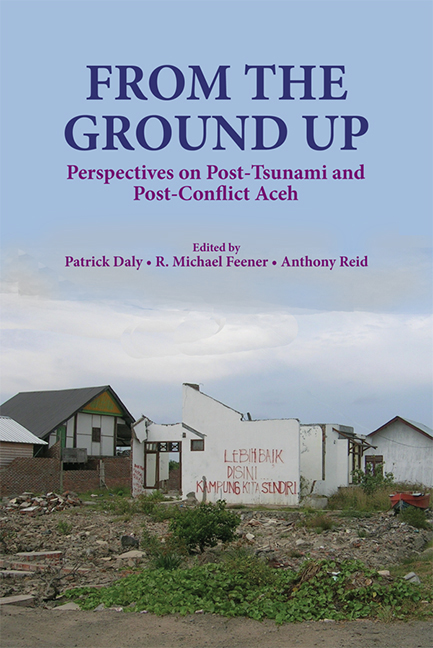Book contents
- Frontmatter
- Contents
- Preface
- List of Figures and Tables
- The Contributors
- Glossary and Abbreviations
- Introduction: Unpacking the Challenges of Post-2004 Aceh
- 1 The Sunda Megathrust: Past, Present and Future
- Part I Reconstruction Efforts
- 2 Disaster Recovery: An International Humanitarian Challenge?
- 3 Linking Relief, Rehabilitation and Development (LRRD) to Social Protection: Lessons from the Early Tsunami Response in Aceh
- 4 Cultural Heritage and Community Recovery in Post-Tsunami Aceh
- 5 Managing Post-Disaster Reconstruction Finance: International Experience in Public Finance Management
- 6 Between Custom and Law: Protecting the Property Rights of Women after the Tsunami in Aceh
- 7 Factors Determining the Movements of Internally Displaced Persons (IDPs) in Aceh
- 8 Aceh's Forests as an Asset for Reconstruction?
- Part II Conflict Resolution
- Index
5 - Managing Post-Disaster Reconstruction Finance: International Experience in Public Finance Management
from Part I - Reconstruction Efforts
Published online by Cambridge University Press: 21 October 2015
- Frontmatter
- Contents
- Preface
- List of Figures and Tables
- The Contributors
- Glossary and Abbreviations
- Introduction: Unpacking the Challenges of Post-2004 Aceh
- 1 The Sunda Megathrust: Past, Present and Future
- Part I Reconstruction Efforts
- 2 Disaster Recovery: An International Humanitarian Challenge?
- 3 Linking Relief, Rehabilitation and Development (LRRD) to Social Protection: Lessons from the Early Tsunami Response in Aceh
- 4 Cultural Heritage and Community Recovery in Post-Tsunami Aceh
- 5 Managing Post-Disaster Reconstruction Finance: International Experience in Public Finance Management
- 6 Between Custom and Law: Protecting the Property Rights of Women after the Tsunami in Aceh
- 7 Factors Determining the Movements of Internally Displaced Persons (IDPs) in Aceh
- 8 Aceh's Forests as an Asset for Reconstruction?
- Part II Conflict Resolution
- Index
Summary
INTRODUCTION
The past decade has presented the development community with some of its most demanding reconstruction challenges since the aftermath of World War II. The World Bank and other development partners have been involved in post-disaster reconstruction in response to the devastation resulting from the tsunami in Indonesia (Aceh), Sri Lanka, the Maldives and India, and also from the earthquakes in Pakistan and Indonesia (Yogyakarta/Central Java). The World Bank and its partners have also supported post-conflict reconstruction following peace agreements in Haiti and Sudan. All these activities came in addition to other large-scale reconstruction programmes in Afghanistan, East Timor and several other countries, most recently Lebanon.
In most cases, such disasters greatly exceed available domestic resources. Consequently, international donor agencies are frequently called upon to finance reconstruction in post-disaster and post-conflict countries. In the case of large-scale natural disasters such as the Indian Ocean tsunami, private contributions were also an important part of the reconstruction programme.
Spending these significant financial resources well has been a key concern in all these reconstruction episodes. Appropriate arrangements for Public Financial Management and Accountability (PFMA) are increasingly viewed as crucial ingredients to ensure that reconstruction proceeds with integrity in a timely and effective manner, while also adequately managing fiduciary risk.
The international community has increasingly emphasized the performance of Public Financial Management (PFM) systems to enhance the use of domestic resources in developing countries and to underpin the scaling up and effectiveness of aid. The strengthening of country financial management systems and donor harmonization have both emerged as key priorities in enhancing aid effectiveness, including through budget support. The recent Public Expenditure & Financial Management Accountability (PEFA) performance indicator framework has focused on benchmarking outcomes as a way of promoting capacity development in the PFMA area.
This chapter focuses on special considerations for strengthening PFM arrangements in post-disaster and post-conflict reconstruction environments that have yet to receive systematic attention. This chapter's objective is twofold: (1) to present key features of PFM in post-disaster environments, and (2) to analyse the similarities and differences between PFM in post-disaster and post-conflict environments.
- Type
- Chapter
- Information
- From the Ground UpPerspectives on Post-Tsunami and Post-Conflict Aceh, pp. 79 - 113Publisher: ISEAS–Yusof Ishak InstitutePrint publication year: 2012



